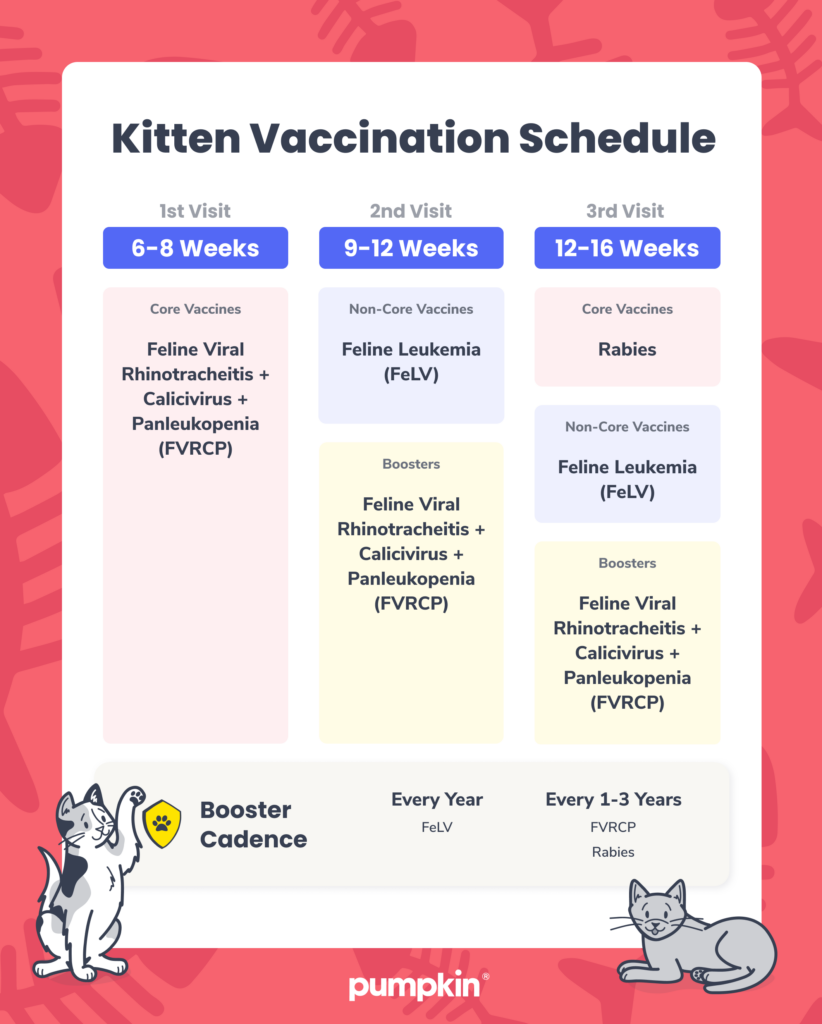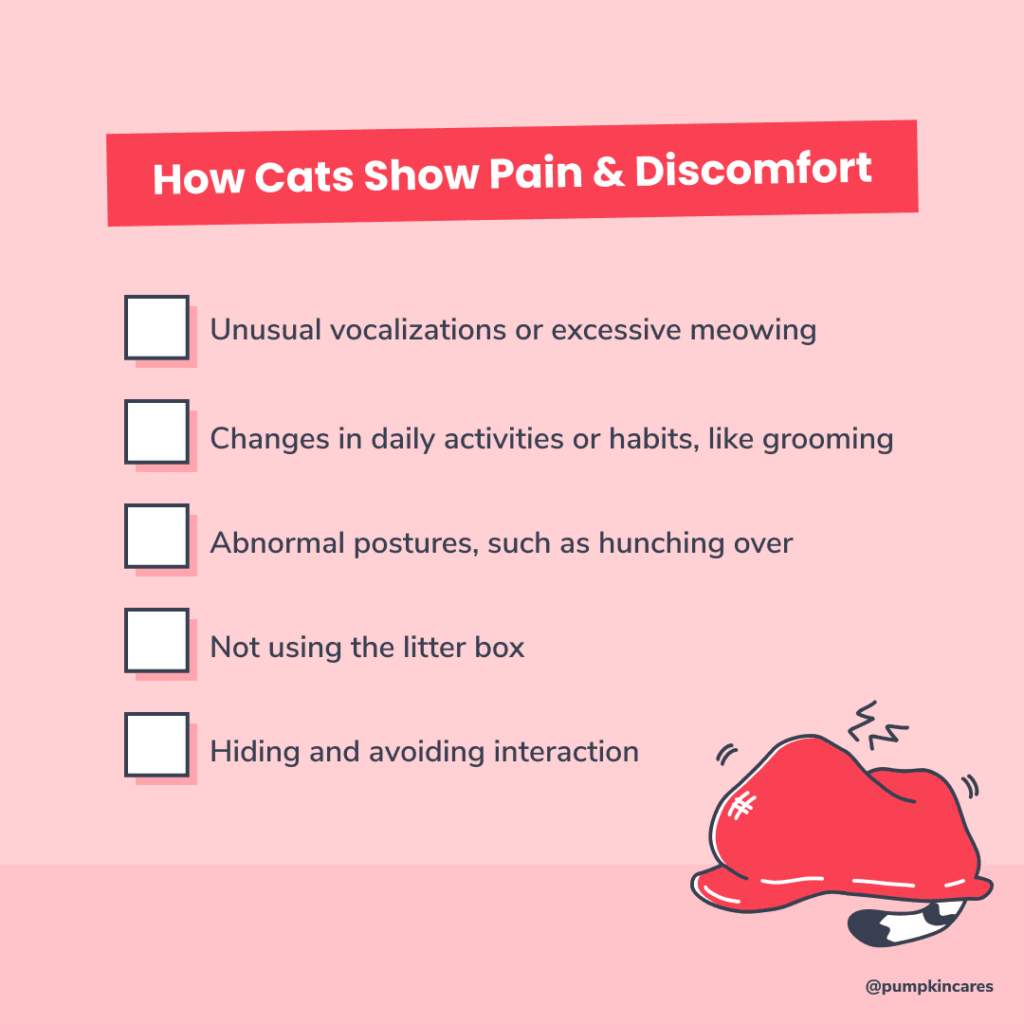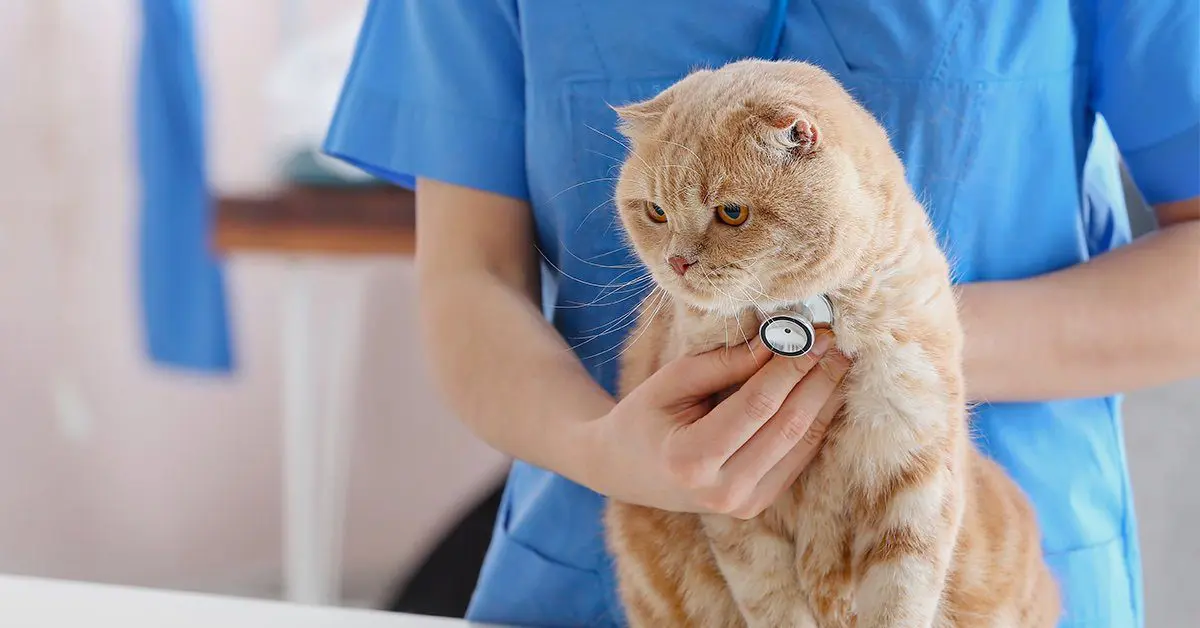Key Points
- Every cat, regardless of their age, should get a checkup at least once a year.
- Kittens should see the vet every few weeks during the first 6 months of their life.
- Senior cats or adult cats with health issues should see their vet at least twice a year.
- The Pumpkin Wellness Club can help you save on crucial preventive care and other pet-friendly perks — plus, members get up to $100 in cash toward their pet’s annual checkup.*
As much as we love our cats for their independent nature, they still need a little help on the health care front. After all, your cat can’t tell you when they’re feeling sick — but a veterinarian can.
Taking your cat to the vet is an essential part of preventive care. These regular check-ups can help you give your feline friend a greater chance at a longer and better life, and preventive care can save you money in the long run. Simple, right?
Not really: According to a 2020 research study, only 40% of cat owners reported visiting a veterinarian at any time, compared to 90% of dog owners who sought veterinary care at some point in their pet’s life. If your cat could read this, they would be side-eyeing you right now.
But it’s not too late to make up for lost time, and Pumpkin recently introduced a new program that can help. The Pumpkin Wellness Club pays pet parents cash for routine vet visits, vaccines, and more, and gives you access to special discounts on top products your cat will love.
So, how often do cats need to see a vet for preventive care?
The American Animal Hospital Association’s (AAHA) general guidelines recommend that all pets — cats and dogs — should have a wellness checkup at least once a year. However, your cat may need to visit the vet more often depending on their age, environment, lifestyle, and health conditions.
Keep reading to learn how often kittens, senior cats, and cats with special needs should see the vet (and how Pumpkin Wellness Club can help you save).
How often do you have to take a kitten to the vet?
You’ll likely bring your kitten to the vet more during their first year of life than any other time for a few reasons:
- To check on your kitten’s growth and overall health
- To ensure they stick to their recommended vaccination schedule
- To recommend and/or discuss additional preventive care for kittens, such as deworming for intestinal parasites, heartworm prevention, and flea and tick prevention
- To spay or neuter your cat (if you choose to do so)
During your first few wellness visits, your veterinarian will conduct a physical examination and administer any necessary vaccines or tests. These visits are an excellent time to ask your veterinarian questions about the best cat food, socialization, litter box training, environmental enrichment, and any other concerns.
Joining the Pumpkin Wellness Club gives you the option to get up to $150 in cash for your cat’s spay or neuter procedure, plus more cash towards annual checkups, vaccinations, and routine fecal tests.
Kitten vaccine timeline
The AAHA and AAFP recommend several core vaccines for young kittens, and the regimen generally starts when kittens are six to eight weeks old. Kittens begin with vaccines for feline calicivirus, feline viral rhinotracheitis, and feline panleukopenia. These are often given in a combination vaccine called the FVRCP vaccine, which protects kittens from all three viruses.

You’ll need to bring your kitten to the vet’s office every three or four weeks to receive an FVRCP vaccine booster until they’re about 12 to 16 weeks old.
Another vaccine considered core for kittens and cats under one year of age is for feline leukemia virus. During your kitten’s visit, around 12 weeks, your vet will likely recommend a blood test to screen for feline leukemia. Feline leukemia vaccine boosters (two of them, 3-4 weeks apart) are recommended for kittens that test negative for feline leukemia.
Finally, when your kitten is around 16 weeks, or about four months old, they’ll receive one rabies vaccine booster. It might sound like a lot of shots for one little furball, but they’re all necessary to give your growing kitten the best protection possible. And if you’re concerned about the cost of vaccinating your kitten, Pumpkin Wellness Club offers up to $150 in cash towards your cat’s vaccines each year.
Tip: Depending on your cat’s health risks, lifestyle (i.e., indoor cats vs. outdoor cats), location, and exposure to other cats, your vet may also recommend non-core vaccines, such as those that protect against chlamydia or bordetella. However, these vaccines are only recommended in particular circumstances.
How often should you take adult cats for a checkup?
Adult cats (one to seven years old) should have annual checkups – though some veterinarians may recommend wellness exams every six months for some cats.
If you have a healthy adult cat with no existing medical conditions, annual checkups should be sufficient throughout your cat’s adult years. However, if your cat has health issues, you may need to visit the vet’s office more frequently than once or twice a year for necessary testing or treatment.
During your adult cat’s annual check-up, your veterinarian typically will:
- Perform a head-to-tail physical examination
- Weigh your cat and evaluate their body condition
- Look at your cat’s teeth – and, if necessary, provide tips for dental care.
- Run routine bloodwork to check your cat’s internal organ functions
- Administer any necessary vaccine boosters
Tip: If your cat is overweight, your vet will likely make dietary and exercise recommendations to help with weight loss, as obesity increases your cat’s risk of diabetes, cancer, and heart disease.
How often should I take my senior cat to the vet?
Once your cat enters their senior years (8 to 10 years old and onward), they’ll be more prone to health problems. It’s inevitable, so as your cat ages, they should have vet visits at least twice per year to stay ahead of common health issues.
During your senior cat’s annual check-up, your veterinarian typically will:
- Perform a head-to-tail physical exam
- Look for bumps, lumps, joint stiffness, limping, weight and muscle composition changes, and similar physical ailments common in older cats
- Run bloodwork and a urinalysis to check your cat’s thyroid, kidney, and liver function and test for diabetes.
- During these visits, your cat may receive vaccine boosters if needed
Tip: Dental disease is common in senior cats. If your cat has dental disease, your veterinarian may recommend a professional dental cleaning, especially if your cat needs teeth removed or is having trouble eating.
When to take your cat to the vet immediately
Hopefully, you’ll only have to take your cat to the vet for regular check-ups. But emergencies do happen, so you should know what to look for and when to go straight to the veterinary hospital.
According to the American Veterinary Medical Association (AVMA), here are some examples of pet health emergencies that require immediate care:
- If your cat experiences severe bleeding, is coughing up blood, or has blood in their urine
- If your cat is choking or has difficulty breathing
- If your cat can’t pass stool or urinate
- If your cat experiences an injury to their eye, or the eye is red, swollen, closed, or seems cloudy suddenly.
- If your cat can’t move their legs or seems to have broken a bone
- If you know or think your cat has eaten something poisonous (lilies, chocolate, onions, garlic, etc.)
- If your cat is experiencing heat stress or heat stroke
- If your cat has diarrhea or extreme vomiting
- If your cat refuses to eat or drink for 24 hours or more
- If your cat is unconscious, staggering, or has seizures
At the end of the day, if you think something is unusual or your cat seems to be in pain, you should at least call your veterinarian for advice. Pumpkin Wellness Club members also get unlimited access to PawSupport, a 24/7 pet health helpline, as one of many perks of joining.

Planning for your cat’s healthy future
As pet parents or owners, we all want our cats to be happy and healthy – and that’s what preventative care is all about.
For the span of your cat’s life (or all nine of them), you’ll be visiting the vet’s office once or twice per year, so finding and choosing a veterinary professional that you like and trust can help make the journey from kittenhood to seniorhood even easier.
If you run into a surprise vet visit for an accident or illness, Pumpkin’s cat insurance plans can help you pay for unexpected vet bills. As for routine vet visits, Pumpkin Wellness Club can help you save up to $390 per year with cash payments towards annual checkups, vaccinations, and more preventive care as well as access to a 24/7 pet health helpline and discounts on top pet products.
DISCLOSURE




